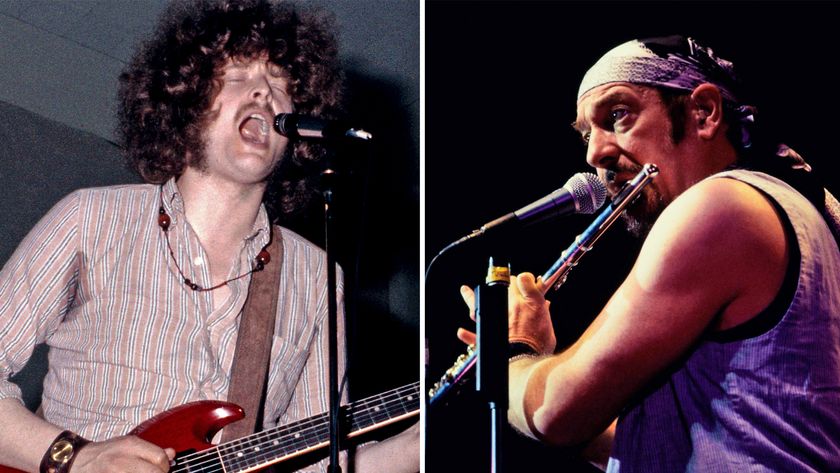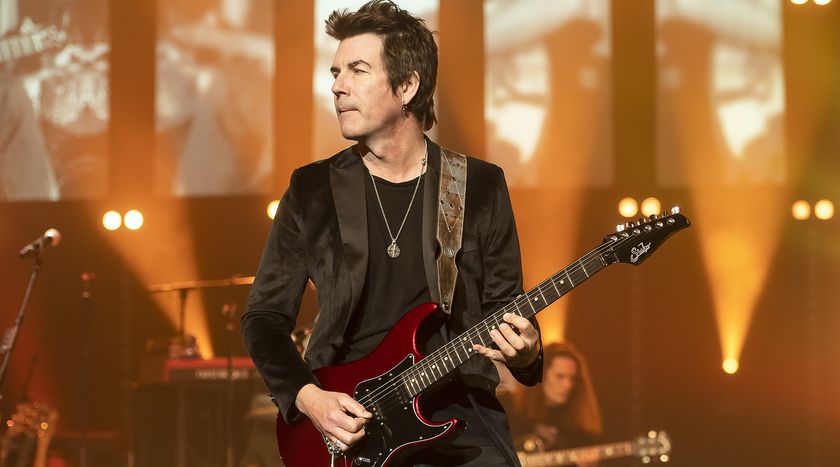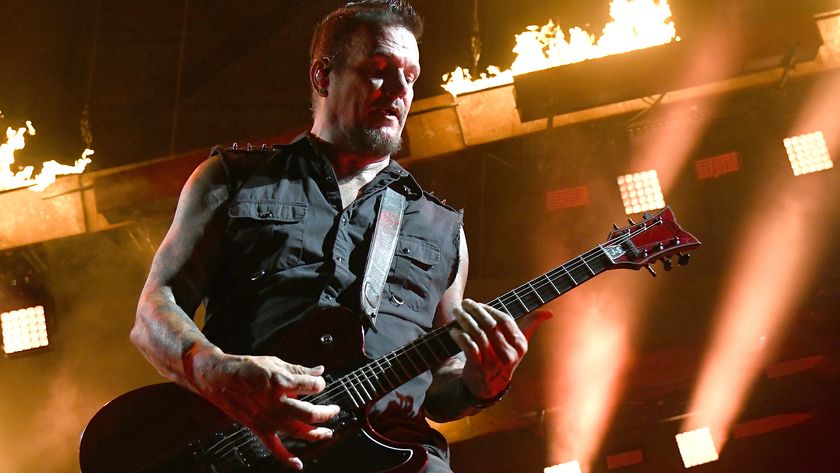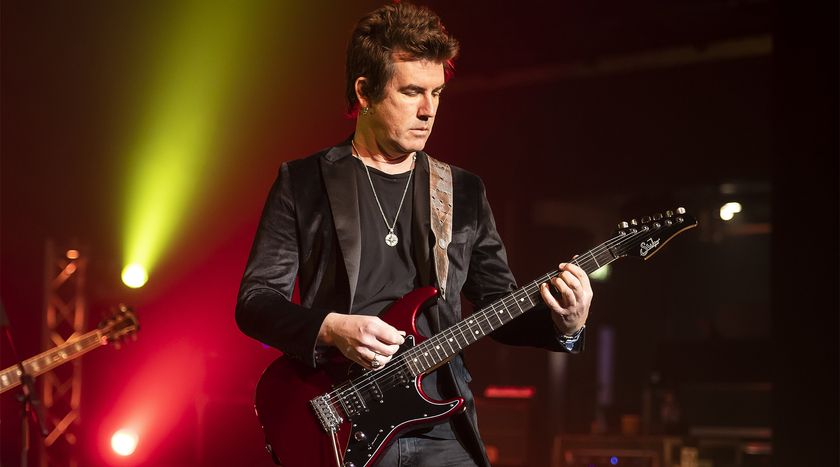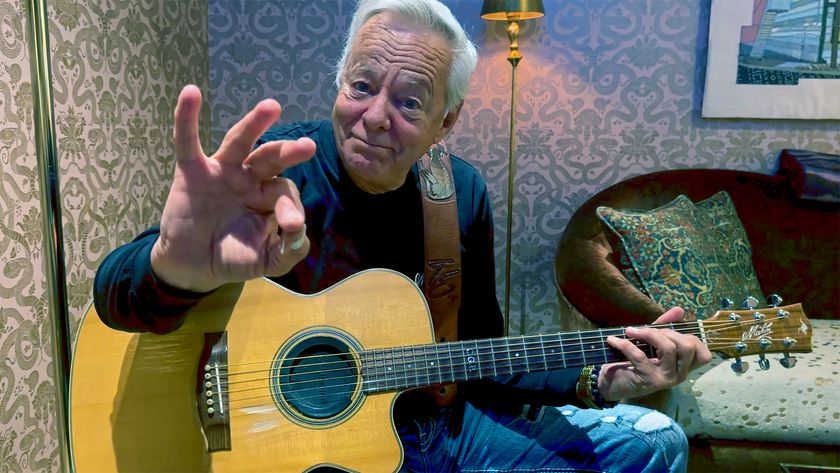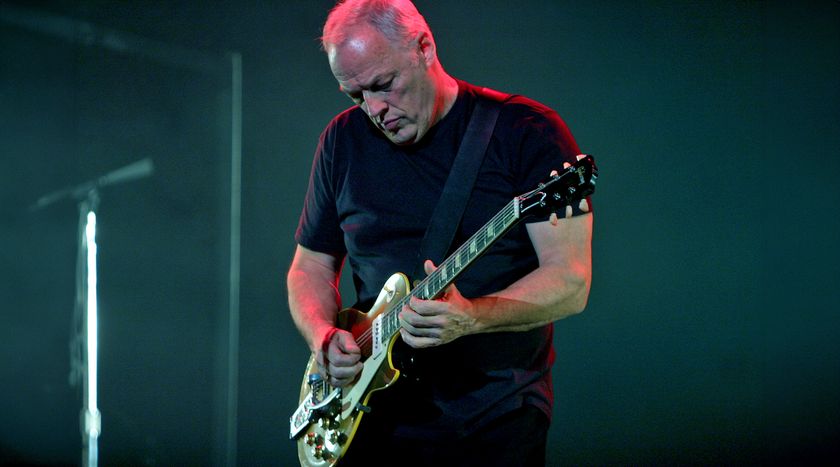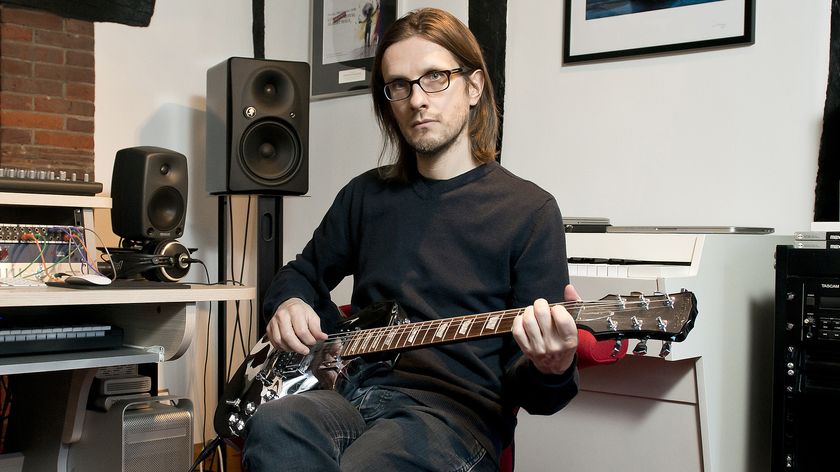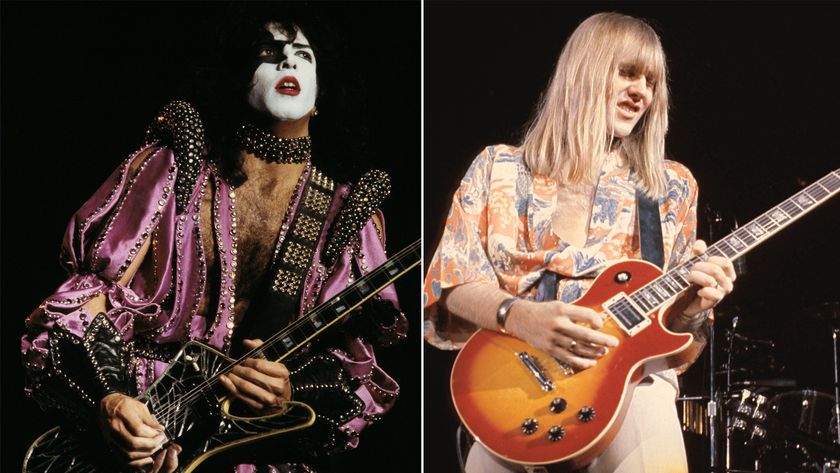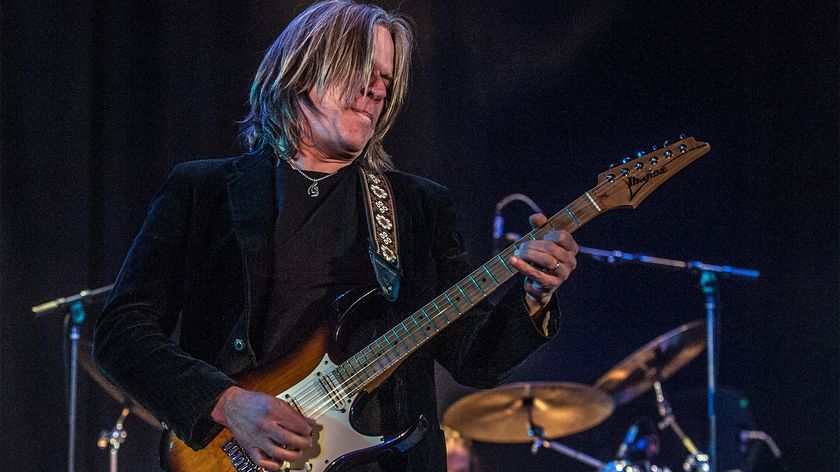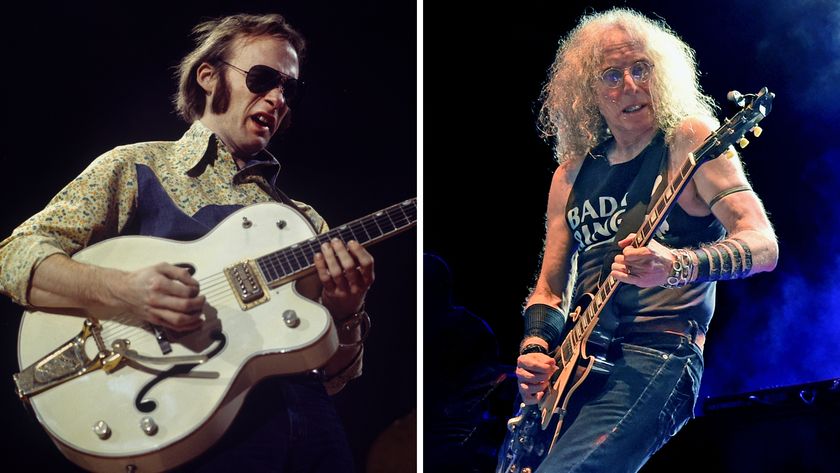"My solos happen so fast that I don't really know what I'm doing. It's like trying to tell somebody about a car crash: It's all over in two-fifths of a second, and then you talk about it for ten hours afterward": A revealing chat with Jeff Beck
In 1999, Jeff Beck sat down with Guitar Player for one of his most revealing interviews. Topics covered: why younger players are "crap", the genius of Eric Clapton, and why "the Marshall sound is the balls"
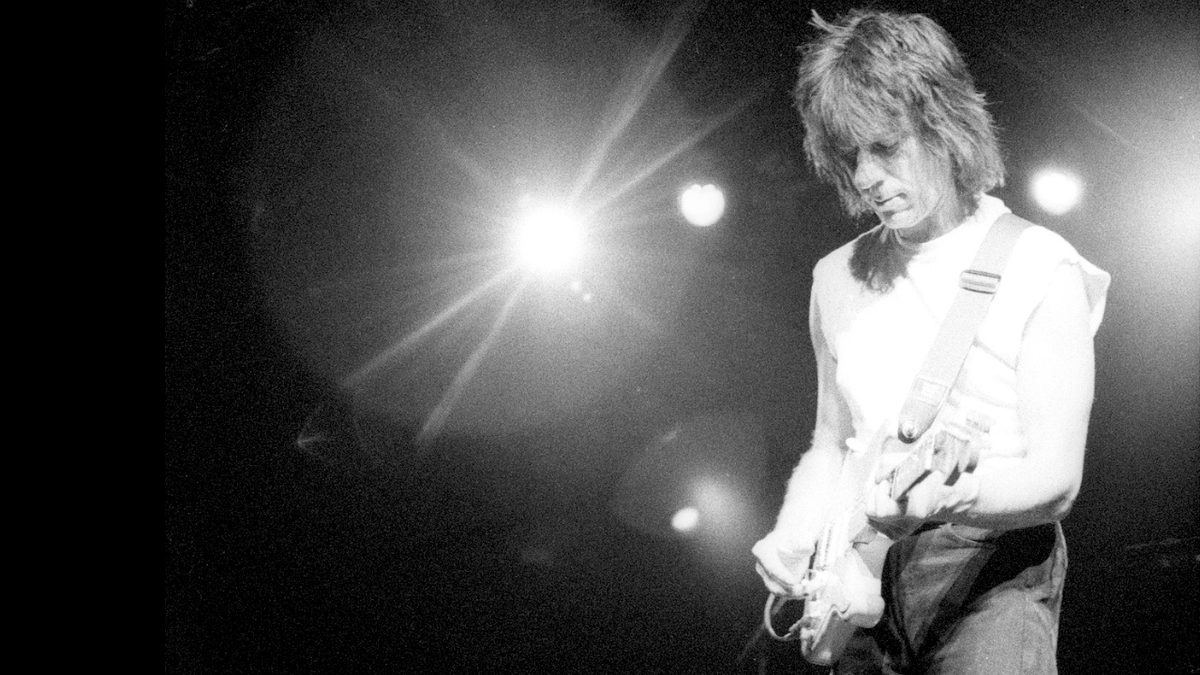
This interview was first published in Guitar Player's issue of May 1999, and is reprinted here in tribute to the man "hailed by many guitar greats as the greatest guitar player ever".
Since Jeff Beck released his first solo album, Truth, in 1968, his output has been frustratingly meager – and a long time coming. A hardcore perfectionist who doubles as his own worst critic, Beck often takes several years between discs to create material he deems worthy, and he throws out far more music than he keeps. In fact, if it were up to him, he'd probably still be mixing Blow by Blow.
The fretboard wizard's latest release, Who Else!, is a collection of 11 instrumentals in a variety of styles, ranging from techno to blues to Irish traditional music. Beck -- who is miffed that the other Beck has made it impossible for him to release an eponymously titled album -- has spent the years since 1989's Guitar Shop listening, absorbing influences, and "shouting at the television." The result is an album that embraces the 90s, pays homage to the past, and looks toward the future of guitar.
Not surprisingly, Who Else! was a difficult album to make. In fact, it was made in two phases over two years, with two separate groups of musicians and producers. The first phase included Pino Palladino on bass with Steve Lukather co-producing, and the only track on the album from those sessions is "Psycho Sam." Phase two was co-produced by Tony Hymas – who also wrote a considerable portion of the album's material – and features Beck's current live band: Jennifer Batten on guitar synth, Steve Alexander on drums, and Randy Hope-Taylor on bass. Guest artists include Jan Hammer and Chrissie Hynde -- who supplies the vocal parts on "Space for the Papa."
Despite the difficult birth, Who Else! is another thrilling chapter in the career of the man hailed by many guitar greats as the greatest guitar player ever. And even if that young, hip-hop-influenced tunesmith does have a popular stranglehold on the surname, for guitarists, there is only one Beck.
You seem to reinvent yourself with every record. Is that a conscious effort?
No, it's just what I absorb through listening to things. It's a perpetual thing. The time between records enables me to become somebody else. I don't know whether people think that I sit around and channel surf or go to the record shop. I don't. In fact, I probably should do more searching for new stuff, but who wants to hear something fantastic? I want to hear that everyone's crap and there's no competition.
What were some of the difficulties you encountered in putting together this record?
To go into a studio with no proper design on how you want to sound is a disaster -- especially with great players. They make anything sound good. You need to have a captain telling you where it's going or you'll hit an iceberg. We crashed into a few icebergs on the way. Unless a miracle happens, your album is never going to get done, whereas if the material is right on, it'll finish itself a lot faster.
We never had a general picture of how the record was going to sound. I wrote one tune which was a very majestic-sounding jungle track with hypnotic, monotonous rhythms. It was a marriage of a Hendrix-y type guitar over a jungle groove, but, unfortunately, it was a novelty track. It lurked about, and I wanted to make an album around that one piece because I was so proud of it, but nothing was made. So it's in the can – the trash can.
The truth of the matter is, we didn't have enough material when we started. The stuff that was coming out was so distant and unrelated. Only one track stuck out, and it was sort of like ZZ Top on speed. It wasn't until the eleventh hour that I rang up Tony Hymas and asked him to write some music. I've got a boatload of stuff which will probably end up being more useful as ballast for the boat.
How long does it take you to get sounds in the studio?
Ten years! I put down the drummer and the bass player first -- they're still the engine in the band, and if they're kicking my backside, I'm happy.
Is it difficult for Jeff Beck, the co-producer of the record, to be objective about the performances of Jeff Beck, the guitarist?
I know when a performance is right. I know when it's sick enough to be acceptable. If it's not twisted enough, I'm not going to use it.
I've heard it takes a long time before you consider a track a "keeper."
It takes the threat of death or a breach of contract. If I ever went into the accounts department at the record company, I'd probably have a heart attack. They must love me because I'm six years behind in the albums I owe them.
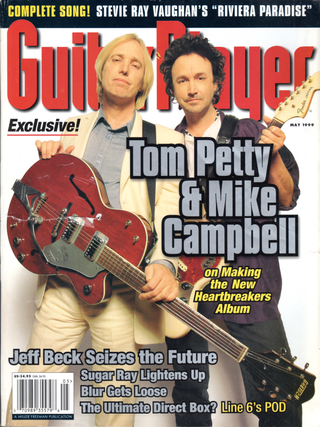
Did you do much pre-production to prepare for the actual recording sessions?
I cut some tracks in my home studio. I have a Mackie 32-8 mixer with the usual junk: a Lexicon LXP-1, some compressors and limiters, two Tascam DA-88s, and one Neumann mic. With that mic, I don't need to go to another studio to record the guitars -- they sound better at my studio than they do anywhere else.
We've moved to new horizons in what we're capable of doing in the home studio. Sampling technology is incredible -- any sound you want is possible now.
What types of guitars, amps, and effects did you use on the record?
My gear was the same on almost all of the tracks. It was just my surf green Strat through one 50-watt Marshall head and a 1960 Marshall BX cabinet loaded with 25-watt Celestion greenbacks. The Marshall is one of the new JCM 2000 Series models -- the DSL50. It has two channels: One has a vintage distortion sound and the other has a classic tone. It sounds like you're playing at a million watts with a nice, agreeable amount of distortion that can be continuously varied. I love it.
"Another Place" and "Angel (Footsteps)," were recorded with a '52 Fender Reissue Telecaster through a DigiTech Legend preamp. The Tele suited those songs perfectly -- it has that liquid, creamy sort of sound, while the Strat is a little bit edgy.
I usually record dry and add all of the outboard stuff in the mix. But for "Another Place," I played through a Lexicon LXP-1 for delay and reverb. There's a nasty hum at the very end of the track -- a rogue element that crept in. At the end of the song, as the note decays, you can hear the buzz come in. But I left it.
Can you tell me more about your Strat?
It's one of the first of my signature models -- the one that was engraved by Little Richard, and that's why I cherish it. It's the one that got battered onstage, and it's the one I always get handed when we play anywhere, so it has became a workhorse. But I'm going to retire it. It has two splits right down the back -- the result of being thrown 60 feet into the air.
What kind of pickups are in that guitar?
They're just stock Fender single-coils.
You're not using Fender Lace-Sensors?
No.
Does it have a huge neck, as did the first production models?
No, but I've probably changed the neck because Fender sends me new necks all the time. I couldn't see the sense of having no options. Obviously, if you buy a new car, you want options. Even if you like the car, you may want a different seat or pedals. It's stupid to make a huge, tree trunk neck if some kid has small hands. But Fender told me they wanted to put out the exact same guitar that I play. So there it is. If you want to change it, then it isn't what I play. But it's whatever you want. I mean, if your guitar sounds the way you want, then make the neck fit it. Get your old man to shave it down.
What kind of frets do you prefer?
I like the Gibson Les Paul-type. I took a little bit of the Gibson tradition -- that kind of big, fat fret thing -- because I didn't like the thin, original Fender frets.
How do you like the action set on your guitars?
I've gone to setting it lower, to get a little more speed. It's about as low as it can go before it starts to buzz. I hate that "fizzing." When I have the fatter strings and I'm in good shape, training-wise, I can afford to lift the action a bit. It does sound better with high action. Hendrix's action was about an inch off the fretboard -- it was really up there.
Where do you prefer pickup height to be set?
I get them as close as I can to the strings, but I set the front pickup a little bit lower because, obviously, you're getting more bass in that position. And I just set the middle pickup so that it doesn't get in the way.
Do you do your own setups?
No – I just play the thing until it literally falls to bits. If I'm having trouble with the action, I will straighten out my own necks and set up the bridges. I enjoy doing it, I just don't let people know that I know how to do it!
How much does the guitar's setup affect your performance?
If I picked up, say, Brian May's or Jennifer's guitars, I probably wouldn't be able to play them. They're all set up so personally to their taste. I need the utility of an "everyman's" setup. That never did any harm to the original rockabilly stars. When you bought a guitar in the 50s, you got what the factory made for you.
Speaking of Jennifer, what was it about her that first caught your attention?
I saw Jennifer with Michael Jackson, but I really remembered her from your magazine. I used to think that girls were just muscling in, that playing guitar was a male thing. But Jennifer is more dedicated than most people I know, including me. Bringing her into the band was definitely a bloody right choice. She's the magical difference. I can't do without her humor. It's so much fun working with her.
Is her role in the band more supportive, like a keyboard player?
It sounds a bit unkind to say that. She's a MIDI guitarist and seems quite happy to fulfill that function. To me, it's great to hear the sound of rocket ships and then hear an organ. She's got it down. But I know she wants to do her own thing, and there's no point in having her do half her act within the constraints of my band. But these are early days, yet. We'll have to wait and see how the band evolves over time.
How were the album's live tracks recorded?
We tried to make a live album in Germany, but it didn't work out. We recorded four concerts, and when we heard the tapes, we thought it was a disaster – not because the playing was particularly rough, it just wasn't as precise as I wanted. Also, the sound was sort of crap. Everything was close-miked – which was totally wrong. It would have been all right for an intimate kind of thing, where you want to hear that dry, in-your-face sound, but that's not what I wanted.
We used a live version of "Brush with the Blues" on the album because it's a totally different animal from the big, powerful stuff we play. It's genuine, there's nothing altered. We just threw up the mics, added a little ambience, and that was it. It was recorded live in Munich at a 2,500-seat venue. "Space for the Papa" is live, too -- although we fixed it up and added Chrissie Hynde's vocal. But the solo is exactly what I played live.
Does your live rig differ from the gear you use in the studio?
No – it's just the Marshall DSL50. I like to keep things simple. On the Guitar Shop tour with Stevie Ray Vaughan in 1989, our rigs were like total opposites. I was using a Fender Twin with one spare for emergency purposes, and Stevie just could not understand what was going on. He had this massive rig with about six amps linked together, and his sound was so rich and full.
I don't know if I'd really want a system like that, but I do plan to try out some new amplification. I bet I'll wind up with the old Marshall again. I understand it. I know its habits and its quirkiness. Also, there's a combination that worked really well for the Guitar Shop album: a Fender Twin and a Princeton wired in series. If you switched off the Princeton, a throatiness in the tone disappeared, and the sound sucked without it.
What are your typical amp settings?
On the Marshall head, the gain is set at about one o'clock. The other channel is set clean with about 10% distortion and turned nearly all the way up. That way, I've got full force on both channels. That's it. For the tone controls, I tend to back off a little on the bass because you don't want all that woof – it can get in the way of the drums and bass. I set it with a lot of midrange, presence, and top end. We kill the whistle on the guitar – if there is any – with the presence control. I have no trouble with that because a lot of my playing is done with all the top end rolled off the guitar. The high frequencies are so cranked on the amp that it sounds toppy enough already. If you were to open up the treble on my guitar, you'd probably kill yourself!
What kind of speakers are you using?
They're stock – probably Celestions.
On your last tour in 1995, you combined Fender Bassmans and 50-watt Marshall Super Lead Plexis. What are the advantages of using Fender and Marshall amps together?
They each serve a different purpose. Let's put it like this: Buddy Holly would not have sounded the way he did with a Marshall. He has the crisp and sparkly thing, which is what the Fender does best. Hendrix couldn't have sounded as good with a Fender -- it has diamond sparkles all over it. That crystal clarity is fine for country bands and Fleetwood Mac, but if you want to get a little bit rude and loud, you've got to have a Marshall. The Marshall sound is the balls. It's the big daddy, and it has that growl that no other amp has.
What's different about the way you approach playing solos live and in the studio?
Obviously, live, you're completely unfettered and don't care about making rattling noises. In the studio, if there's a nasty noise, you stop. I try to make the solos as nutty as possible, disregarding the punch-in and punch-out, and just playing to get ideas on tape. That's the main thing, at all costs. Nine times out of ten, I'll rehearse something and then not play it. We'll get to the punch-in, and I'll do something else.
Are most of your live solos totally improvised?
Yeah. There's no design. In fact, they happen so fast that I don't really know what I'm doing half the time. It's like trying to tell somebody about a car crash. It's all over in two-fifths of a second, and then you're talking about it for ten hours afterward. All I know is that there are certain stages during a solo where I realize whether it's going well or not. If it's not going well, then I jump in and try to rescue it.
Do you ever use Pro Tools to piece together solos?
I might try it, but the music still must exist as an organic launching pad. For example, sometimes an acceptable accident happens where I think, "I would've done that, but I didn't. This happened instead." In that case, using Pro Tools to move things around is merely accomodating something that's humanly possible.
What kind of slide did you use on "Space for the Papa," and which finger did you wear it on?
I used a Plexiglas tube and a capo. It gave me that metallic kind of overtone – a real smooth, almost trombone-like sound. I wear it on my middle finger because I can play single-string solos with the slide stuck in the air.
Do you ever use open tunings when you play slide?
Not really. I've played in standard tuning for so long that I automatically sound like Muddy Waters or George Thorogood or Elmore James when I tune to an E chord.
In recent years, you seem to have gained more technical control over the instrument in terms of playing harmonics and microtones.
That's because I've been so impressed by Eastern music and John McLaughlin. Guys like that are sent here for a purpose – besides to piss you off – as the standard that you have to look at. They exist – they're not figments of your dreams. You can go out and buy the records, listen to them, and learn from them. That's exactly what I did. I got the Bulgarian Women's Choir CD and I thought, "Well, maybe I should just sit and listen to this for about ten years." That CD is the most agonizingly wonderful thing. It had nothing to do with rock and roll, but it impressed me just as much – a part of my psyche moves into tears every time I hear it.
From a technical standpoint, I inadvertently discovered a way of getting microtones and such out of the Strat and making music out of them. Up to that point, the Strat was Buddy Holly's guitar – and Cliff Gallup's of the Blue Caps – and was played very conventionally.
How do you keep the strings in tune with a standard tremolo?
What makes you think they stay in tune? Fender has come a long way in keeping the tuning problems at bay, but a new string will still always go off until you've stretched it. The roller nut on my guitar has a twin roller on the first three strings – which helps to keep those strings in check – and the tremolo is a standard spring tremolo. It's not like the Floyd Rose which slackens them off until they're dangling on the floor. I think that's a complete waste of time. I just make sure that the spring tension on the tremolo arm is exactly what I want. If that isn't right and there isn't enough upward motion – or if it goes down and bottoms out – I'm in trouble. It's basically down to the string thickness – if the thickness of one string is off, it throws the whole thing out.
What type of strings are you using?
I use Ernie Ball strings and I'm planning to move up to a .012 on the first string. But that's brutal. I need to be on tour for about two months before that gauge is comfortable. Right now, I'm using an .011 on the first string, and a .048 or .050 on the bottom string.
You've been playing without a pick for many years now. Who did you listen to while developing your fingerpicking technique?
I listened to the 50s Merle Travis and Chet Atkins records, and although I loved that style, I never wanted to have a career where I sit on a stool and play. I just did it because I wanted to know how it was done, but I never thought I'd ever put that style into practice. I simply couldn't see the sense of wasting all of the other fingers by holding a pick between your thumb and first finger. The loss of the pick was a blessing in disguise, really.
How much abuse do your hands sustain during a gig?
Not a lot, but the first week of a tour is like murder. When you're onstage you don't notice the pain, but afterwards I see the dark red spots on the tips of my fingers. Usually they heal pretty well. If I keep practicing everyday, I'm all right. When I don't, the trouble starts.
How do you maintain the nails on your picking hand?
The nails on my right hand are a little bit longer than on my left. I just keep them just long enough so that they protect the fingertips. If I cut them too short, it's a bit painful.
Has your relationship with the guitar changed over the years?
It's a battered wife. It's embarrassing. I'm sure the society for the protection of battered guitars has my picture. There's always something in the guitar which never ceases to amaze me, some sick sound that I never heard before. That's what my job is, really. It's not playing fantastic runs and trying to dazzle everybody, it's coming up with some little cheesy trick. This is rock and roll.
As an instrumentalist, you have the gift of being able to use the guitar in place of the human voice.
That seems to be what I do. So many instrumental bands sound like either a zipped-up version of the Ventures or a backing track that needs a vocal.
Many people believe you don't practice.
I practice every day – sometimes even longer than five minutes! You can practice subconsciously, you know, and if you're watching TV, it's better to have something strapped around your neck than not. But you're not gonna get in there if you don't practice. You have to sit there until you get it right.
What do you think of the state of music today?
It's a bit like a silent movie, isn't it? It's about time to move onto the talkies! I do enjoy some techno bands – especially the Prodigy. If you see the Prodigy in full flood, forget it. There are not many metal bands that can keep up with that.
Do you listen to your own work?
I don't want to hear it once it's done. Sometimes I will, but only if I'm feeling strong enough to handle it. If my ego's down, I won't put it on.
What do you think of some of the younger up-and-coming players?
Crap.
But you did play with Jonny Lang at the Grammy Awards.
He was suffering from laryngitis, so any after-hours chat or jamming was out the window because he had to go back and rest. I never really heard him play – which was a bummer. I think it's wonderful that the young guys get a "girlie" crowd. I don't mean that disrespectfully – Jonny waves the flag for the blues, which is great, because if young guys like him don't carry it on, it's going to die.
Who do you consider the most important guitarists of our time?
Eric Clapton and Jimi Hendrix, I suppose. Jimmy Page, too, although he was sort of an ambassador for riffs and mystique, rather than an innovator.
Django Reinhardt is still the best guitarist, and there's no question about that, ever. Stevie Ray Vaughan was great, of course. He had a large chunk of Hendrix in him, and Hendrix carried a big chunk of Buddy Guy. In 1959, Buddy was doing all of that showbiz stuff, playing around with the guitar and teasing the audience with it. T-Bone Walker used to do that, too. He used to finish off his act by playing with one hand while carrying his amp off with the other. I thought that was the coolest thing in the entire universe when I saw that.
Albert Lee is still the king of that kind of country stuff, and I don't hear enough of it. And Jennifer is going to be monstrous. I can't wait for her to get out and do her thing.
But Eric has just become phenomenal. There's no one else like him with an electric guitar. Even though he sings non-rock songs these days, he's still a great influence on rock guitar. I'm proud that he's British. And, of course, Hendrix still has more of a bark even though he has been dead for nearly 30 years. It's astonishing, the interest in someone who only had an 18-month to two-year career. It's amazing.
Where do you see guitar music heading in the next decade?
Although I want music to stay pure, we're going into the 21st Century and you've got to be with it -- whether you like it or not. In 20 years, you won't find all these blues bands playing slightly updated and hot-rodded Muddy Waters songs. I've remained pretty much faithful to what I do on guitar – without any tricks – and whatever else changes around that, it's all right by me.
I can't really tell you more than that, except that if I don't hear something that makes me want to grab a guitar and run up onstage, I might as well go home. That's a good measuring stick. And it's the techno bands that are inspiring me to get myself going again.
This interview was first published in Guitar Player magazine, May 1999. Subscribe to Guitar Player here.
Get The Pick Newsletter
All the latest guitar news, interviews, lessons, reviews, deals and more, direct to your inbox!

"Shane called me and said, 'The guitar is here. It plays amazing. It's providence calling!’” How an extremely rare goldtop 1958 Les Paul Standard found its way into the hands of Imagine Dragons guitarist Wayne Sermon
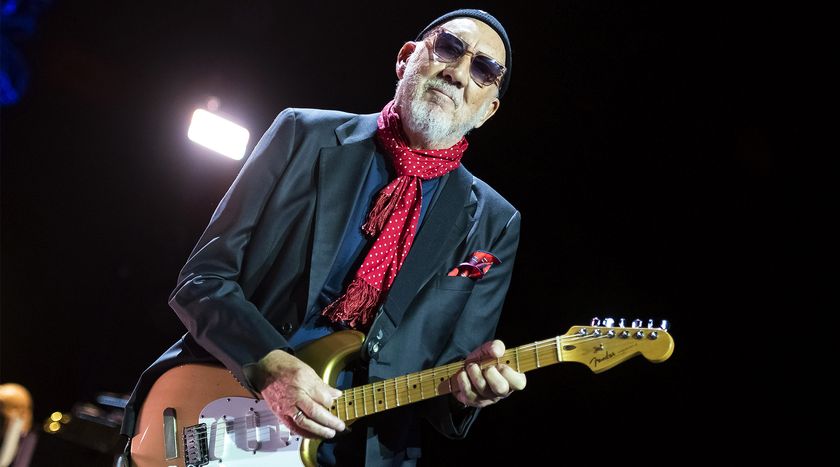
“A lot of Who fans would be really pleased.” Pete Townshend ponders using AI to re-create his ‘70s heyday for fans who prefer the Who's classic songs




